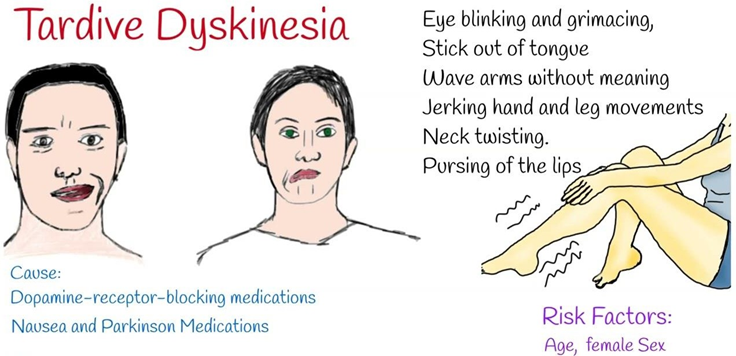A nurse is collecting data from a client who has schizophrenia and recently stopped taking chlorpromazine after 8 years. The nurse notes choreiform movements, lip smacking, and spastic facial distortions. The nurse should document these findings as indicating which of the following conditions?
Akathisia
Dystonia
Pseudoparkinsonism
Tardive dyskinesia
The Correct Answer is D
A. Akathisia refers to a subjective feeling of restlessness and an objective inability to sit still.
It's characterized by a need to move constantly and is not typically associated with choreiform movements, lip smacking, or spastic facial distortions.
B. Dystonia involves sustained or intermittent muscle contractions leading to abnormal postures or twisting movements. It typically presents with muscle spasms, not choreiform movements or lip smacking.
C. Pseudoparkinsonism refers to a collection of symptoms that resemble Parkinson's disease, such as tremor, bradykinesia, rigidity, and postural instability. It does not typically involve choreiform movements or lip smacking.
D. Tardive dyskinesia is a movement disorder characterized by involuntary, repetitive movements of the face and body, including choreiform movements (rapid, jerky movements), lip smacking, and spastic facial distortions. It often develops after long-term use of antipsychotic medications like chlorpromazine and can persist even after discontinuation of the medication.

Nursing Test Bank
Naxlex Comprehensive Predictor Exams
Related Questions
Correct Answer is A
Explanation
A. Fluoxetine, a selective serotonin reuptake inhibitor (SSRI), can cause changes in weight.
Reporting weight changes to the healthcare provider is important for monitoring and managing potential side effects.
B. Fluoxetine and other antidepressants should not be stopped abruptly without consulting a healthcare provider, even if the client starts feeling better. Abrupt discontinuation can lead to withdrawal symptoms and worsening of depression.
C. Fluoxetine does not typically interact with cheese or tyramine-containing foods. This statement reflects a misunderstanding of the medication's dietary restrictions.
D. Fluoxetine is usually taken once daily in the morning due to its potential to cause insomnia as a side effect. Taking it at bedtime may exacerbate sleep disturbances.
Correct Answer is A
Explanation
A. A lithium level of 1.2 mEq/L falls within the therapeutic range (0.6-1.2 mEq/L) for the treatment of bipolar disorder. Therefore, the nurse should administer the regular dose of lithium as prescribed and closely monitor the client for any side effects.
B. Repeating the lithium level is unnecessary because the current level is within the therapeutic range. Repeated testing may be warranted if the level is outside the therapeutic range or if there are clinical concerns.
C. This action is not indicated for a lithium level within the therapeutic range. ECG and seizure precautions are typically reserved for lithium toxicity, which presents with levels above the therapeutic range.
D. Increasing the dose of lithium is not warranted when the current level is within the therapeutic range. Doing so could increase the risk of toxicity.
Whether you are a student looking to ace your exams or a practicing nurse seeking to enhance your expertise , our nursing education contents will empower you with the confidence and competence to make a difference in the lives of patients and become a respected leader in the healthcare field.
Visit Naxlex, invest in your future and unlock endless possibilities with our unparalleled nursing education contents today
Report Wrong Answer on the Current Question
Do you disagree with the answer? If yes, what is your expected answer? Explain.
Kindly be descriptive with the issue you are facing.
